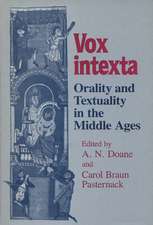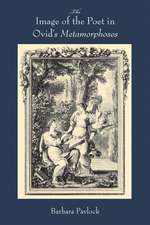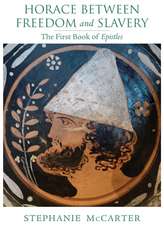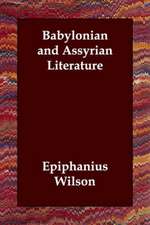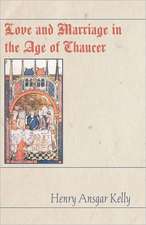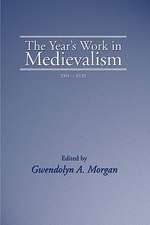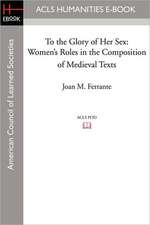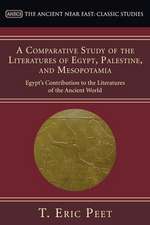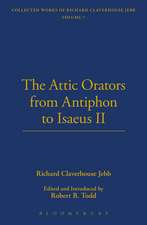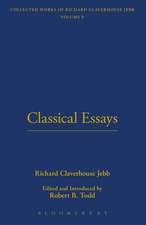A Symposion of Praise: Horace Returns to Lyric in Odes IV: Wisconsin Studies in Classics
Autor Timothy Johnsonen Limba Engleză Paperback – 9 ian 2007
Ten years after publishing his first collection of lyric poetry, Odes I-III, Horace (65 B.C.-8 B.C.) returned to lyric and published another book of fifteen odes, Odes IV. These later lyrics, which praise Augustus, the imperial family, and other political insiders, have often been treated more as propaganda than art. But in A Symposion of Praise, Timothy Johnson examines the richly textured ambiguities of Odes IV that engage the audience in the communal or "sympotic" formulation of Horace's praise. Surpassing propaganda, Odes IV reflects the finely nuanced and imaginative poetry of Callimachus rather than the traditions of Aristotelian and Ciceronian rhetoric, which advise that praise should present commonly admitted virtues and vices. In this way, Johnson demonstrates that Horace's application of competing perspectives establishes him as Pindar's rival.
Johnson shows the Horatian panegyrist is more than a dependent poet representing only the desires of his patrons. The poet forges the panegyric agenda, setting out the character of the praise (its mode, lyric, and content both positive and negative), and calls together a community to join in the creation and adaptation of Roman identities and civic ideologies. With this insightful reading, A Symposion of Praise will be of interest to historians of the Augustan period and its literature, and to scholars interested in the dynamics between personal expression and political power.
Johnson shows the Horatian panegyrist is more than a dependent poet representing only the desires of his patrons. The poet forges the panegyric agenda, setting out the character of the praise (its mode, lyric, and content both positive and negative), and calls together a community to join in the creation and adaptation of Roman identities and civic ideologies. With this insightful reading, A Symposion of Praise will be of interest to historians of the Augustan period and its literature, and to scholars interested in the dynamics between personal expression and political power.
Din seria Wisconsin Studies in Classics
-
 Preț: 71.93 lei
Preț: 71.93 lei -
 Preț: 357.07 lei
Preț: 357.07 lei -
 Preț: 160.09 lei
Preț: 160.09 lei -
 Preț: 321.58 lei
Preț: 321.58 lei -
 Preț: 116.93 lei
Preț: 116.93 lei -
 Preț: 58.57 lei
Preț: 58.57 lei -
 Preț: 208.26 lei
Preț: 208.26 lei -
 Preț: 238.93 lei
Preț: 238.93 lei -
 Preț: 322.99 lei
Preț: 322.99 lei -
 Preț: 403.33 lei
Preț: 403.33 lei -
 Preț: 149.95 lei
Preț: 149.95 lei -
 Preț: 66.23 lei
Preț: 66.23 lei -
 Preț: 118.67 lei
Preț: 118.67 lei -
 Preț: 306.60 lei
Preț: 306.60 lei -
 Preț: 229.03 lei
Preț: 229.03 lei -
 Preț: 310.57 lei
Preț: 310.57 lei -
 Preț: 336.39 lei
Preț: 336.39 lei -
 Preț: 153.95 lei
Preț: 153.95 lei -
 Preț: 428.40 lei
Preț: 428.40 lei -
 Preț: 429.75 lei
Preț: 429.75 lei -
 Preț: 227.80 lei
Preț: 227.80 lei -
 Preț: 506.04 lei
Preț: 506.04 lei - 15%
 Preț: 478.78 lei
Preț: 478.78 lei -
 Preț: 247.73 lei
Preț: 247.73 lei -
 Preț: 402.76 lei
Preț: 402.76 lei - 15%
 Preț: 476.54 lei
Preț: 476.54 lei -
 Preț: 178.13 lei
Preț: 178.13 lei -
 Preț: 257.29 lei
Preț: 257.29 lei -
 Preț: 119.03 lei
Preț: 119.03 lei -
 Preț: 166.72 lei
Preț: 166.72 lei -
 Preț: 187.37 lei
Preț: 187.37 lei -
 Preț: 199.67 lei
Preț: 199.67 lei -
 Preț: 218.12 lei
Preț: 218.12 lei - 23%
 Preț: 608.98 lei
Preț: 608.98 lei - 23%
 Preț: 589.87 lei
Preț: 589.87 lei -
 Preț: 347.37 lei
Preț: 347.37 lei -
 Preț: 305.89 lei
Preț: 305.89 lei -
 Preț: 122.89 lei
Preț: 122.89 lei -
 Preț: 177.37 lei
Preț: 177.37 lei - 23%
 Preț: 591.20 lei
Preț: 591.20 lei -
 Preț: 160.48 lei
Preț: 160.48 lei -
 Preț: 258.14 lei
Preț: 258.14 lei -
 Preț: 258.25 lei
Preț: 258.25 lei - 23%
 Preț: 450.63 lei
Preț: 450.63 lei - 23%
 Preț: 709.57 lei
Preț: 709.57 lei -
 Preț: 502.03 lei
Preț: 502.03 lei -
 Preț: 246.80 lei
Preț: 246.80 lei
Preț: 258.86 lei
Nou
Puncte Express: 388
Preț estimativ în valută:
49.53€ • 51.85$ • 40.99£
49.53€ • 51.85$ • 40.99£
Carte tipărită la comandă
Livrare economică 05-19 aprilie
Preluare comenzi: 021 569.72.76
Specificații
ISBN-13: 9780299207441
ISBN-10: 0299207447
Pagini: 344
Dimensiuni: 152 x 229 x 20 mm
Greutate: 0.47 kg
Ediția:1
Editura: University of Wisconsin Press
Colecția University of Wisconsin Press
Seria Wisconsin Studies in Classics
ISBN-10: 0299207447
Pagini: 344
Dimensiuni: 152 x 229 x 20 mm
Greutate: 0.47 kg
Ediția:1
Editura: University of Wisconsin Press
Colecția University of Wisconsin Press
Seria Wisconsin Studies in Classics
Recenzii
“Timothy Johnson’s A Symposion of Praise is an important book for its bold argument about the nature of panegyric in Horace’s fourth book of odes . . . it provides many valuable insights into Horace’s lyric practice as a whole and its literary, cultural and historical background. Whether one is ultimately convinced by the book’s overall argument or not, its metaphor of the symposium as an interpretive community for Horace’s panegric poetry is an intriguing one, likely to provoke further thought about the nature of Horatian lyric.”—Ronnie Ancona, Ordia Prima
Notă biografică
Timothy Johnson is associate professor of classics at the University of Florida.



